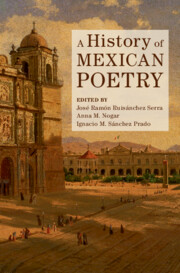Book contents
- A History of Mexican Poetry
- A History of Mexican Poetry
- Copyright page
- Contents
- Figures
- Contributors
- Introduction
- Chapter 1 The Practice of Epic and Lyric Writing in Colonial Mexico
- Chapter 2 La lírica del Fénix: Sor Juana’s Poetic Legacy
- Chapter 3 The Sound of the Word: Music and Social Transgression in Lyric Poetry from the Colonia Onward
- Chapter 4 We, the Romantics
- Chapter 5 Sentimental Sociabilities: The Young Romantics and Their Long-Lived Widows
- Chapter 6 Modernismo’s Strategic Occidentalism: Notes on Manuel Gutiérrez Nájera, Amado Nervo, and José Juan Tablada
- Chapter 7 The Crepusculars: Criollo Modernism and the Invention of the Literary Province
- Chapter 8 Poesía en voz alta: A Trajectory of Poetry and Performance in México
- Chapter 9 The Great Synthesis of the Critical Poets: The Rise of Octavio Paz
- Chapter 10 Octavio Paz and the Institutions of Poetry
- Chapter 11 The Form That Contains Multitudes: The Mexican Long Poem (1924–2020)
- Chapter 12 Radical Freedoms: Neobaroque, Postpoetry
- Chapter 13 The Age of Anthology
- Chapter 14 Twentieth-Century Mexican Poetry: The Popular and the Political
- Chapter 15 Poetry in Indigenous Languages: From the Sixteenth to the Twenty-First Centuries
- Chapter 16 Chicanx Poetry: The Living Lyric
- Chapter 17 Racimos: Dissonances in Mexican Poetry of Today
- Index
- References
Chapter 13 - The Age of Anthology
Published online by Cambridge University Press: 21 March 2024
- A History of Mexican Poetry
- A History of Mexican Poetry
- Copyright page
- Contents
- Figures
- Contributors
- Introduction
- Chapter 1 The Practice of Epic and Lyric Writing in Colonial Mexico
- Chapter 2 La lírica del Fénix: Sor Juana’s Poetic Legacy
- Chapter 3 The Sound of the Word: Music and Social Transgression in Lyric Poetry from the Colonia Onward
- Chapter 4 We, the Romantics
- Chapter 5 Sentimental Sociabilities: The Young Romantics and Their Long-Lived Widows
- Chapter 6 Modernismo’s Strategic Occidentalism: Notes on Manuel Gutiérrez Nájera, Amado Nervo, and José Juan Tablada
- Chapter 7 The Crepusculars: Criollo Modernism and the Invention of the Literary Province
- Chapter 8 Poesía en voz alta: A Trajectory of Poetry and Performance in México
- Chapter 9 The Great Synthesis of the Critical Poets: The Rise of Octavio Paz
- Chapter 10 Octavio Paz and the Institutions of Poetry
- Chapter 11 The Form That Contains Multitudes: The Mexican Long Poem (1924–2020)
- Chapter 12 Radical Freedoms: Neobaroque, Postpoetry
- Chapter 13 The Age of Anthology
- Chapter 14 Twentieth-Century Mexican Poetry: The Popular and the Political
- Chapter 15 Poetry in Indigenous Languages: From the Sixteenth to the Twenty-First Centuries
- Chapter 16 Chicanx Poetry: The Living Lyric
- Chapter 17 Racimos: Dissonances in Mexican Poetry of Today
- Index
- References
Summary
Although the first anthology of Mexican poetry dates from 1833, Alejandro Higashi argued in his seminal volume PM-XXI-360 that the primary role of the anthology in Mexico changed in 1966. Traditionally a genre that presents a selection of previous work shaped by a certain notion of taste, the anthology took on an overtly prescriptive role with the first edition of Poesía en movimiento, edited by Octavio Paz, Alí Chumacero, José Emilio Pacheco, and Homero Aridjis. This text has remained in print ever since, and has privileged a practice of “demanding poetry” that has been taken up by later anthologies. The chapter also discusses the “cloning lab” of the anthology and how this phenomenon can be discerned in the profusion of anthologies published since the 1980s.
- Type
- Chapter
- Information
- A History of Mexican Poetry , pp. 242 - 257Publisher: Cambridge University PressPrint publication year: 2024

